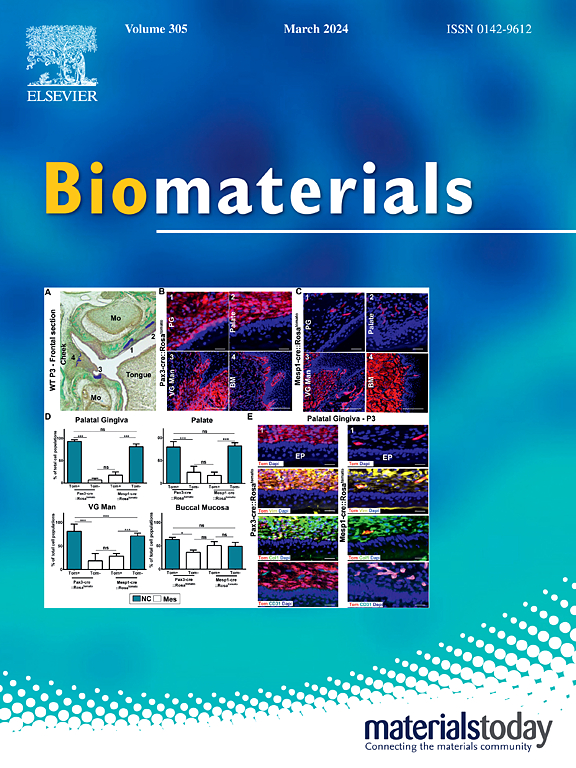Orally-deliverable liposome-microgel complexes dynamically remodel intestinal environment to enhance probiotic ulcerative colitis therapy via TLR4 inhibition and tryptophan metabolic crosstalk
IF 12.8
1区 医学
Q1 ENGINEERING, BIOMEDICAL
引用次数: 0
Abstract
Probiotics emerges as a promising option for ulcerative colitis (UC) treatment, but its application remains challenging due to insufficient colon-targeted delivery efficiency and survival against the inflammation-associated intestinal oxidative stress. To address these issues, here we report a supramolecular liposome-microgel complex (SLMC) incorporated with Bacillus subtilis spores (BSSs) and dexamethasone (DEX) for orally-deliverable probiotic UC therapy. Specifically, BSSs and cholesterols were conjugated with gelatin via diselenide ligation to prepare microgels, followed by supramolecular complexation with UC-targeted DEX-loaded liposome via microfluidic engineering. The orally-administered SLMC efficiently accumulated in UC-affected colonic sites to release BSSs and DEX. DEX elicited rapid anti-inflammatory effect to reduce ROS generation, which cooperated with the ROS consumption by spore germination and diselenide cleavage to orchestrate an anaerobic intestinal microenvironment, thus promoting Bacillus subtilis colonization to restore gut homeostasis and initiate anti-inflammatory microbiota-macrophage metabolic crosstalk. Indeed, in vivo analysis showed that the SLMC treatment markedly inhibited pro-inflammatory TLR4-NF-κB signaling activities in mucosal macrophages through localized DEX delivery and boosting tryptophan metabolite production, leading to robust and durable UC abolishment. This study offers a practical approach for improving UC treatment in the clinic.

口服脂质体-微凝胶复合物动态重塑肠道环境,通过TLR4抑制和色氨酸代谢串扰增强益生菌溃疡性结肠炎治疗
益生菌作为治疗溃疡性结肠炎(UC)的一种有希望的选择,但由于结肠靶向递送效率和抗炎症相关肠道氧化应激的生存能力不足,其应用仍然具有挑战性。为了解决这些问题,我们报道了一种超分子脂质体微凝胶复合物(SLMC)与枯草芽孢杆菌孢子(bss)和地塞米松(DEX)结合用于口服益生菌UC治疗。具体来说,bss和胆固醇通过二烯醚连接与明胶结合制备微凝胶,然后通过微流体工程与uc靶向dex负载脂质体进行超分子络合。口服SLMC有效地积聚在uc影响的结肠部位,释放bss和DEX。DEX可引起快速的抗炎作用,减少ROS的产生,并与孢子萌发和二烯酰胺裂解消耗ROS共同协调肠道厌氧微环境,从而促进枯草芽孢杆菌定植,恢复肠道稳态,启动抗炎微生物-巨噬细胞代谢串扰。事实上,体内分析表明,SLMC治疗通过局部递送DEX和促进色氨酸代谢物的产生,显著抑制粘膜巨噬细胞中促炎TLR4-NF-κB信号活性,导致UC的持久消除。本研究为临床改善UC治疗提供了一种实用的方法。
本文章由计算机程序翻译,如有差异,请以英文原文为准。
求助全文
约1分钟内获得全文
求助全文
来源期刊

Biomaterials
工程技术-材料科学:生物材料
CiteScore
26.00
自引率
2.90%
发文量
565
审稿时长
46 days
期刊介绍:
Biomaterials is an international journal covering the science and clinical application of biomaterials. A biomaterial is now defined as a substance that has been engineered to take a form which, alone or as part of a complex system, is used to direct, by control of interactions with components of living systems, the course of any therapeutic or diagnostic procedure. It is the aim of the journal to provide a peer-reviewed forum for the publication of original papers and authoritative review and opinion papers dealing with the most important issues facing the use of biomaterials in clinical practice. The scope of the journal covers the wide range of physical, biological and chemical sciences that underpin the design of biomaterials and the clinical disciplines in which they are used. These sciences include polymer synthesis and characterization, drug and gene vector design, the biology of the host response, immunology and toxicology and self assembly at the nanoscale. Clinical applications include the therapies of medical technology and regenerative medicine in all clinical disciplines, and diagnostic systems that reply on innovative contrast and sensing agents. The journal is relevant to areas such as cancer diagnosis and therapy, implantable devices, drug delivery systems, gene vectors, bionanotechnology and tissue engineering.
 求助内容:
求助内容: 应助结果提醒方式:
应助结果提醒方式:


